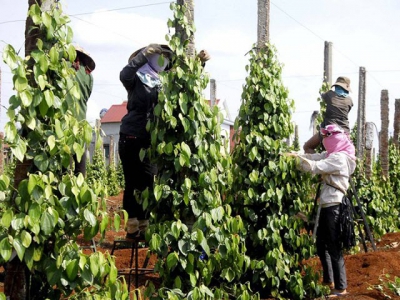What are the corporate income tax incentives for pepper growing activities?

The General Department of Taxation has just given feedback on the problems of a number of businesses recognized by the Research and Development Board of the private economy.
The enterprise's pepper growing activities are entitled to CIT incentives according to regulations. Source: Internet.
Planting pepper trees entitled to CIT incentives
According to the Research and Development Board of the private economy, a number of businesses investing in high-quality pepper processing plants are subject to a corporate income tax (CIT) of 20%, applicable for the form of preliminary processing of products similar to manual production workshops.
Therefore, the Vietnam Pepper Association proposes to apply a CIT rate of 15% in the form of processing for enterprises with standard pepper processing factories, contributing to helping businesses reduce production costs, strengthen competitiveness in the international market and at the same time encourage enterprises to invest more heavily in R&D and deep processing activities.
In addition, it is necessary to have a clear definition of the terms "preliminarily processed" and "processed" because there are currently no specific regulations, making it difficult for tax authorities to determine the form of products and applicable tax rates.
Responding to this, the General Department of Taxation said that according to the provisions of Law No. 71/2014/QH13 (amending and supplementing a number of articles of the Law on Corporate Income Tax No. 14/2008/QH12, which was amended 32/2013/QH13), which takes effect from January 1, 2015, enterprises' incomes from cultivation, husbandry, farming and processing of agricultural and aquatic products come under the specific provisions as follows: if they are in extremely difficult socio-economic areas, they shall be exempt from CIT; if it is generated in difficult socio-economic areas, the CIT rate of 10% is applied.
Along with that, the income of farming, breeding and processing enterprises in the field of agriculture and fishery in areas that are not in difficult socio-economic conditions or in areas with poor socio-economic conditions shall be subject to the following incomes: associations with special difficulties are entitled to the tax rate of 15%.
Regarding the proposal of the Vietnam Pepper Association, the General Department of Taxation affirmed that the enterprise's pepper planting activities are entitled to CIT incentives according to regulations. For pepper processing activities, it is recommended that the Pepper Association contact the Ministry of Planning and Investment (the state agency that develops and submits to the Government for promulgation the Vietnam Economic Sector System) to determine the industry code of the Vietnamese economy in accordance with the laws.
Deductible expenses when determining taxable income
The Research and Development Board of the Private Economy said that the implementation of the post-inspection mechanism of the tax sector is a reform policy that many businesses have supported over the years.
However, the recent implementation process has caused many problems at the implementation stage because there are no specific regulations on a number of expenses in CIT finalization such as some businesses have been issued invoices and vouchers of companies that were bankrupt or dissolved at the time of the checks, even though it was a reasonable expense at the time of the invoice.
Or as in the case of businesses with many invoices, they are rejected for the reason that "costs are too high" and often have costs of receiving guests, fuel, advertising. There are also businesses that have to pay interest on bank loans for "borrowing too much".
Responding to the comments of the Central Economic Research and Development Board, the General Department of Taxation said that, in principle, the expenses related to production and business activities have sufficient invoices and documents as prescribed in Clause 1 of this Article. Article 4 of Circular No. 96/2015/TT-BTC is included in deductible expenses when determining taxable income.
In case enterprises use invoices in contravention of the law on invoices, these expenses are not eligible to be included in deductible expenses when determining taxable income.
Particularly, for a number of expenditures exceeding the control limit according to legal documents on CIT, the excess expenditure is not included in deductible expenses when determining taxable income.
Related news
 Commodity-oriented rice production - an effective direction of Huong Trang Cooperative
Commodity-oriented rice production - an effective direction of Huong Trang Cooperative Huong Trang Cooperative was established in June 2015, it has gradually affirmed the effectiveness and cohesion between the cooperative
 Hanoi plans for flowers, ornamental plants to grow into spearhead sector
Hanoi plans for flowers, ornamental plants to grow into spearhead sector The capital city of Hanoi has asked districts and communes to plan for flowers and ornamental plants to become a key sector of the capital’s economic developmen
 San Diu ethnic farmer grows the most expensive litchis in Vietnam
San Diu ethnic farmer grows the most expensive litchis in Vietnam One of the two largest litchi growing areas in Vietnam, owns an orchard that grows the most expensive litchis in the country.